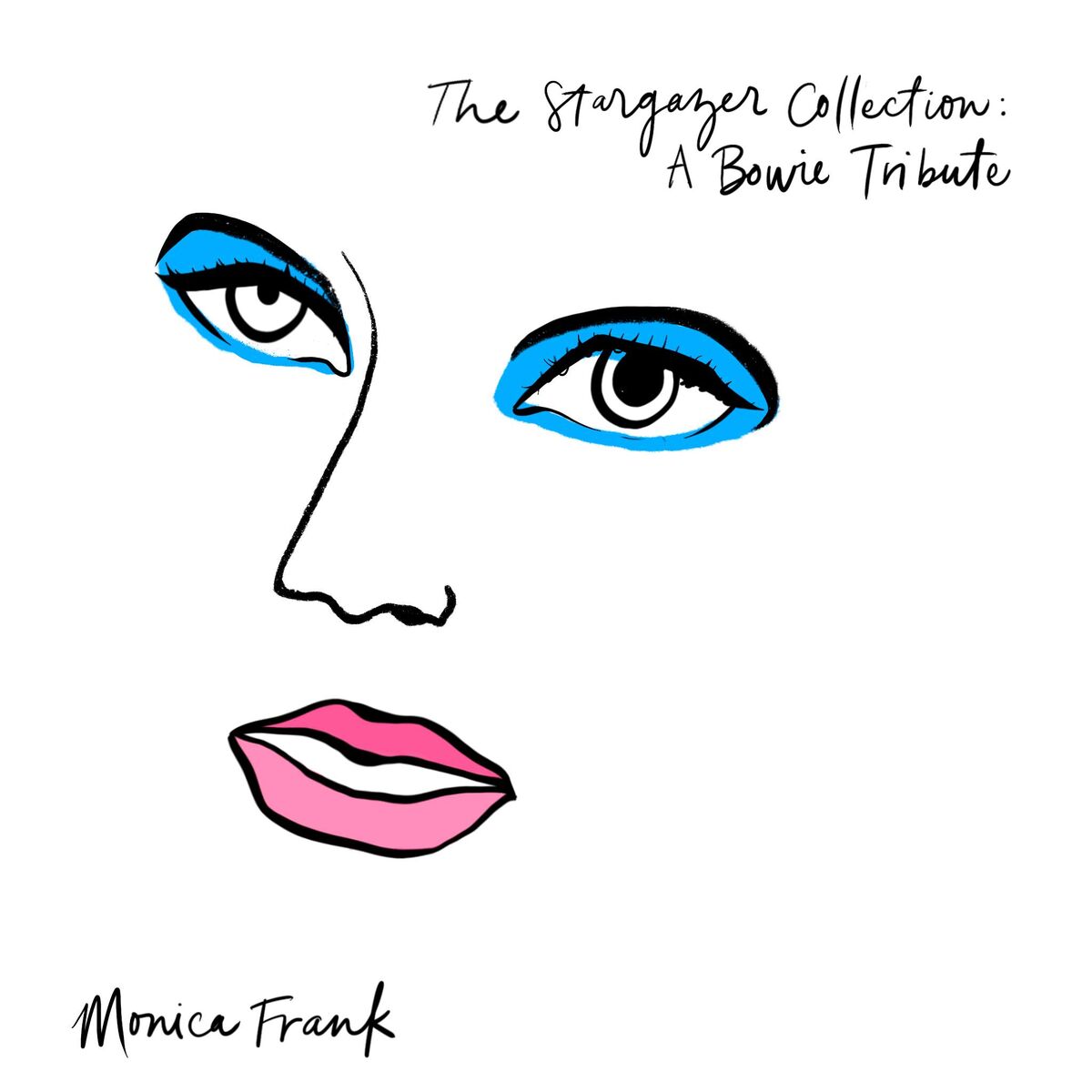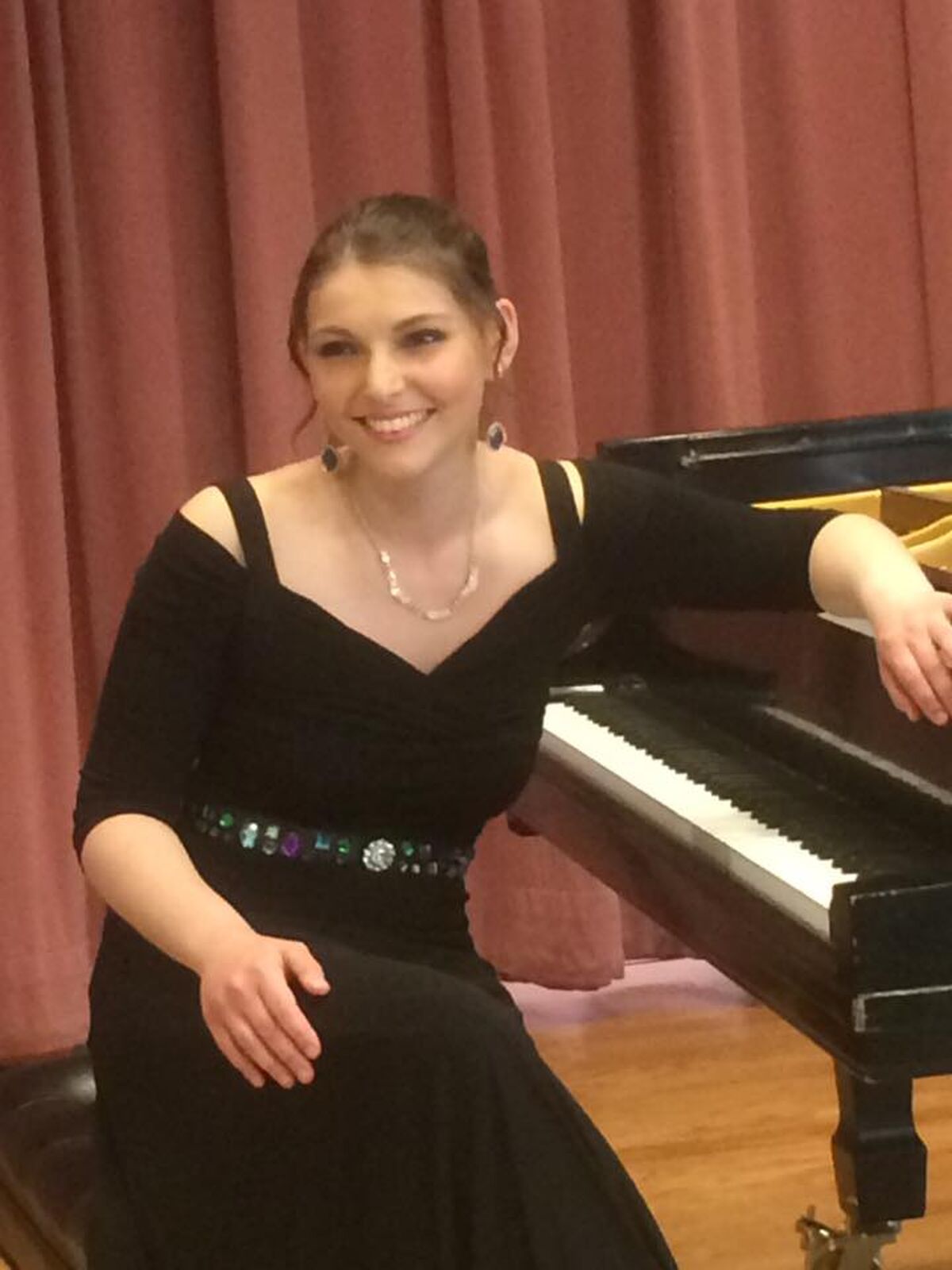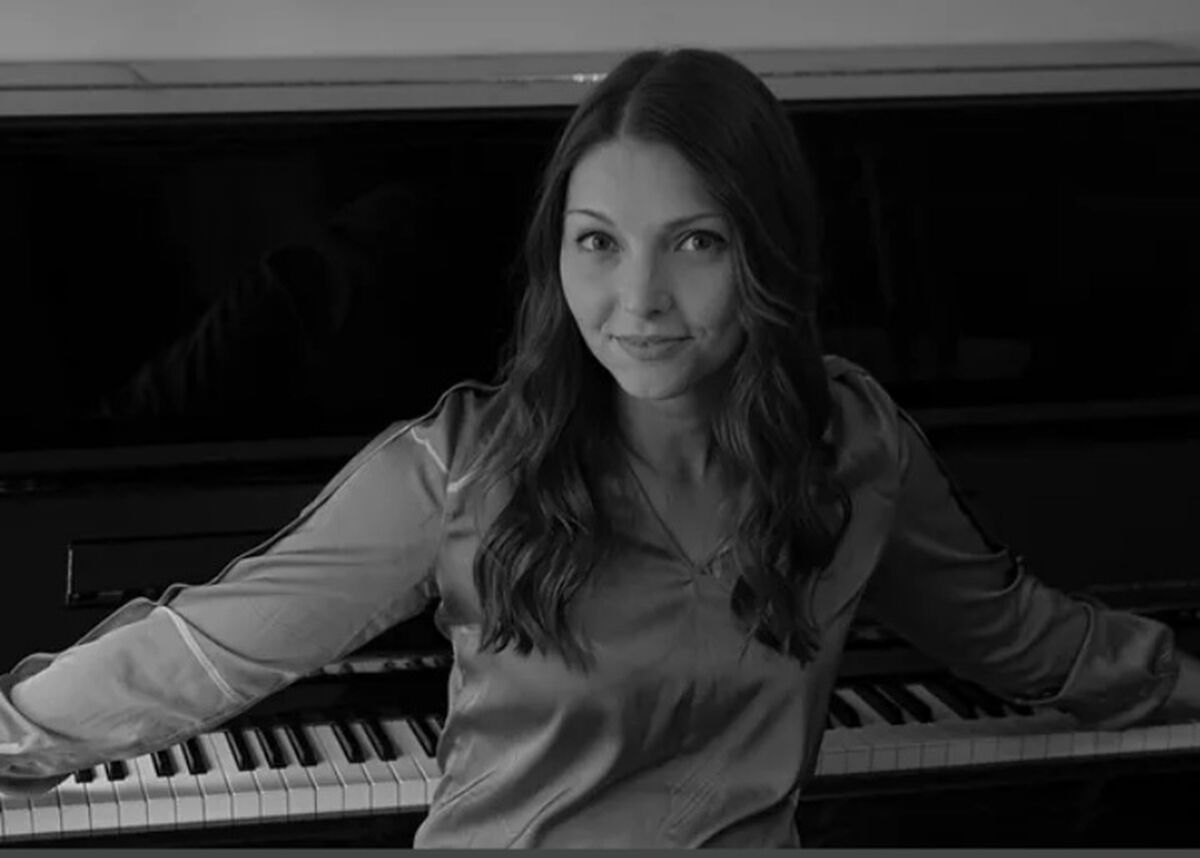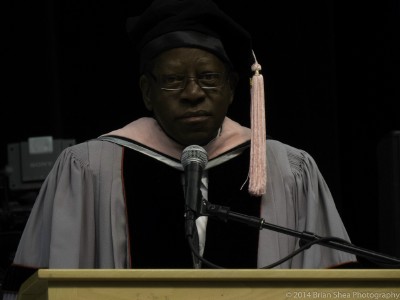In the last century of contemporary music, very few artists have left a mark of indelibly stature more than the late great David Bowie. The English artist has inspired and still inspires, to these days and through his immense body of work, millions of musicians around the world in many different art forms, at times, even not necessarily related to music per se.
One of these many musicians inspired by the magnitude of Bowie's songbook, is Monica Frank, a classically trained pianist originally from the States, but currently based in London. After getting her master's degree from New York City's Manhattan School Of Music, Frank has been mentored by the "historical" Bowie's pianist and composer Mike Garson, who, since her invitation to perform at 2019's A Bowie Celebration show in London, has been working closely with Frank via online meetings and email, while the young London-based artist was working on the arrangements she wrote of some of David Bowie's music for piano solo.
Frank's love for David Bowie's music has resulted in a debut album called The Stargazer Collection: A Bowie Tribute released in 2021, for which Mike Garson himself has highly praised the young pianist for the quality of her arrangements and overall outcome of the record.
We had the opportunity to converse with this talented pianist few months following the release of The Stargazer Collection: A Bowie Tribute, trying to find out a bit more about the making of this brilliant record.

BR - Hi Monica and congratulations for your debut album The Stargazer Collection - A Tribute To David Bowie. Could you please walk us through the genesis of this fascinating music project?
MF - Hello, thank you. It took me a few years after I finished my master degree and to get my first pieces recorded to the standard that I wanted. Then I reached out to Mike Garson, about this project, shortly after I graduated and start getting the wheels in motion. We started emailing each other and having online piano lessons with him, where I would also show him the work that I was doing on the arrangements, while he would provide me with some very useful tips. We had quite a few of those lessons over the past few years, but I have done most of the work on the project on my own and Mike would essentially provide me with feedback on what I was doing.
BR - It is rather an unusual choice, for a music artist, to start a career with a tribute album, rather than releasing original material. Did David Bowie make a huge impact on your musical roots, Monica?
MF - Absolutely. The idea of doing this project came naturally, out of my love and respect for him and his music. To choose Bowie as the epicenter of this project, it wasn't a casual choice at all. Basically, I always felt that, with Bowie's music, there was this cultural force about him that expanded beyond the standard definition of Rock music. His artistry was so influential through decades in so many different art forms, either visual or even related to fashion, make-up industry and so on. To these days, when I look around me, I still feel his strong impact and presence in many different aspects of our society and culture. On top of that, I always felt that his songs offer a lot of harmonic complexity than your stereotypical Rock song. His chord progressions take always unexpected turns that can be challenging, even for a highly trained musician but, at the same time, also be easy to remember for everybody. That is, to me, what makes Bowie's music be so fascinating, something that I am never tired to be listening to. In a way, I also and always saw his music, rather than a standard Rock artist's songbook, as the body of work of sorts that can be easily compared to music artists of the stature of Gershwin or Cole Porter's collections.
BR - You are undoubtedly a classical trained pianist, Monica and for this very reason, we were wondering how challenging has it been, for you, to incorporate in your classical background those many musical variations that Bowie has adopted into his musical repertoire throughout his whole career, including those songs where Mike Garson's sophisticated and complex layers of sound added an extra spice to them?
MF - One thing that I thought was important for me to establish, during the compositional making of the pieces, it was to allow myself to incorporate particular pianistic devices that I wanted to use, because I thought that would work really well with the arrangement of a specific Bowie's song that I had in mind. Also, I thought of what songs of Bowie's wide catalog would stand out, especially for me, for their adaptability to piano arrangements. I was getting particular ideas for specific sections of the pieces and I wanted to ensure to choose those Bowie's songs that could reflect my vision and my ideas on the arrangements I wanted to put in place. As a classical pianist, I haven't actually any Jazz or overall improvisational training, something that Mike Garson is widely gifted with, therefore all my arrangements for the pieces included into The Stargazer Collection - A Tribute To David Bowie have been notated out and learned, so they sound exactly the same when I played them. I feel that, what the record expresses, it exudes exactly the way I wanted to make Bowie's songs to sound, through my own vision.
BR - We noticed that the pieces that you have chosen to re-arrange in your own style are part of the first two decades of Bowie's career. Taking into consideration some obvious choices, due to the notoriety of the songs, one particular piece comes to mind, which is Lady Grinning Soul, a tune that David Bowie has never played live in any of his shows and a song that, we know, is one of the many songs close to Mike Garson's heart too. What inspired you to choose this particular tune and to make it sound so brilliantly as you did?
MF - Funnily enough, Lady Grinning Soul is one of my most favourite Bowie's songs ever too, an extra thing in common I share with Mike. When I started working on my personal vision of that song, I wanted to still stick in part with the song's original arrangement in a way, because I think of that song being perfect as it is, with that gorgeous Spanish-inspired sway. Still, though, I wanted to apply those pianistic devices I was telling you of previously on that song too, particularly on the standout vocal slides that Bowie did on that song, especially on the fade-out section of it, so incredibly beautiful. What I did, it was writing some chromatic runs, which you probably heard, repeated a couple of times near the end of my arrangement. That was my homage, my personal way to try and mimic that vocal style that Bowie applied on that song, which I thought was truly beautiful. As far as an homage to Mike's specifically, obviously we all know and love his intro, on Lady Grinning Soul, a sort of wonderful piano concerto itself and I did not wish to copy or even attempting to copy the wonderful job that Mike had already done, on that song. I tried, instead, to find my own way to express my style on the intro, by trying to infuse it with a mysterious, shimmering sound, something that I applied also in the outro section of the tune, a way for me to convey that incredible elegance and mysteriousness of one of many of Bowie's masterpieces.

BR - Did you find any of the Bowie's songs that you chose particularly challenging for you to rearrange in your own style and vision?
MF - I would say that out of the one I did, Time was perhaps the most challenging one, a song that some may say I have arranged in a slightly controversial style. As I mentioned before, none of my arrangements were improvised at all and that includes also working on Time; I played exactly the parts that I had already in mind and written, before starting the recording of Time. With that song, I wanted to maintain that Piano Bar kind of vibe, writing the piece with that type of Cabaret tempo to it. I also wanted to maintain the original, slightly grotesque and creepy edge to it, with its melodramatic discussion about mortality, that surrealist edge to it that may make some people be slightly uncomfortable about it. When it came to choose the tonality for Time, especially for the beginning and the end of the tune, it was a bit tricky, because I wanted to make it sound a bit jarring but, at the same time, still retaining that melodic shape of the original.
BR - There is no doubts that the album is your personal homage to Bowie and the love you feel for his songbook. By the same token, though, we guess that you wished also to pay tribute to the genius and talent of Mike Garson, who played for Bowie throughout almost 40 years, in and out. Was the idea of closing the album with some of Garson's own tunes off his solo album called Nowtude your personal way to say "Thank You" to the guidance and support that Mike has provided for you in the making of your debut album?
MF - Mike's contribution to the overall collection of great piano Etudes was unique in many ways, especially if compared to many different and great composers in the past that have written different collections of Etudes, like Chopin or Debussy, among many others. I used, for my record, what I felt right for me to arrange out of Mike's addition to the great history of piano Etudes, by taking a deep look to the different characters present in Nowtude, which are 24, one per different key. Some of those characters were more, like, very Jazz sounding, with a lot of improvisational moments, although all of the tunes present in Nowtude are notated; some of the other pieces were more kind of Pop and Rock sounding, with a bit more contemporary feel to them, while some other, that can easily labeled as Classical pieces, were sounding like they were written in a completely different era. One of the latter in particular, to me, it felt like it might have been written by Liszt himself, truth to be told (smiles).
BR - Whilst we had the opportunity to hear some outtakes off your beautiful album that were not included on its original release and having enjoyed them a lot, we were wondering whether you are considering writing brand new original material on your own.
MF - I have not yet written an original piece by myself but I guess that, starting arranging somebody else's musical pieces in your own style, it is the ideal starting point to then create original material by myself. The only time I tried to have a stab on working on original material, it was with my brother. He is a Jazz saxophonist and sometimes, we work back and forth with each other on Jazz tunes. He is certainly a far better composer than I am (smiles) and to him, it comes more natural but I am sure the time will come for me too, sooner or later, to start writing my own pieces.
BR - Are you considering touring the album, Monica, at least in the UK for the time being and once the situation with the pandemic will ease out a bit more?
MF - I would certainly love to do that. As you may have realized, by looking at the full length of my album, I haven't got yet enough material to run a Solo Tour and I feel that, to be able to do a proper Solo show, I may need to work on maybe 5 or 6 more arrangements to be added to the ones present on my album, in order to be able at least to do an hour show, at least. One thing for sure, now that I have finally released my first record, I cannot wait to start working on my second album, something that would also allow me to have enough material to consider doing either sporadic Solo shows or a proper Tour.
BR - Monica, where do you see yourself and your music going, in about 10 years from now? Do you feel you will keep on working on classical pieces, either your personal ones or other artists' ones or do you see yourself, perhaps, trying to give a stab on mixing your classical skills with genres like Jazz or Electronica, for example.
MF - Right now, I can see myself to be fundamentally a Classical type of artist, because it is there that my roots as a pianist come from. If I would be really pushed and given my love to those genres, I would maybe try to give a stab to arrange or re-arrange Pop or Rock tunes, in future. But, right now and as a pianist, I would most certainly choose to write pieces of a more Classical style, because I feel that belongs the most to my artistic roots.
The Stargazer Collection: A Bowie Tribute is out now and it is available to be purchased on Amazon


